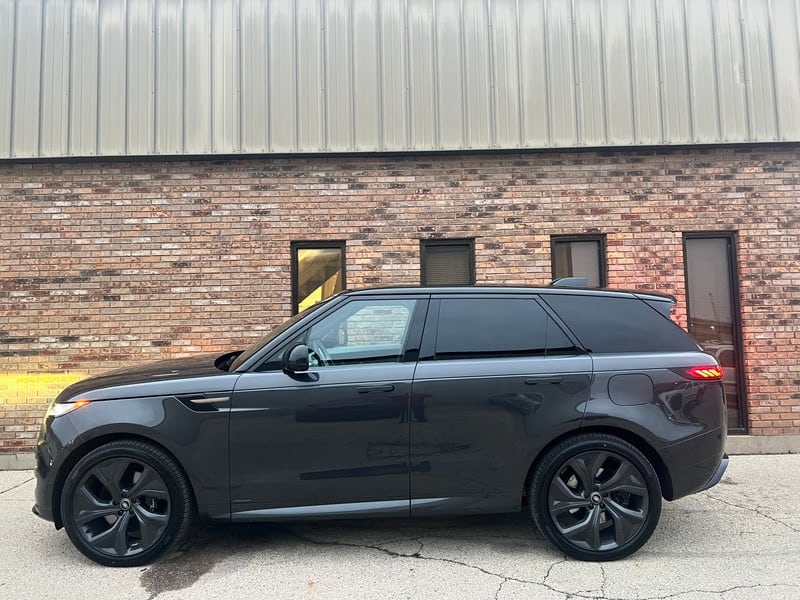The days of luxury SUVs being simply defined by plush interiors and commanding road presence are long gone. Today, these big price tag SUVs are expected to balance performance, efficiency, and technology in one package. The 2025 Range Rover Sport Autobiography PHEV was designed to do exactly that.
I tested the Range Rover Sport Autobiography PHEV for a week and found it to seamlessly blend traditional Range Rover elegance with plug-in hybrid efficiency and a surprising performance balance. My test vehicle also demonstrated how quickly the price of exclusivity can climb. But then, again, it is a Range Rover.
Range Rover styling has always walked a fine line between ruggedness and elegance, and the 2025 Sport Autobiography continues that tradition. My tester came dressed in a handsome Carpathian Grey exterior finish, a premium $1,750 option (worth every penny), and complemented by SV Bespoke 23-inch dark grey wheels with carbon inserts ($3,450). Combined, these features give the SUV an unmistakable road presence that is confident, polished, and instantly recognizable.
This Rover’s design is clean and modern, with flush door handles, slim headlights, and an overall shape that communicates both performance and sophistication. While some buyers might find the oversized wheels slightly harsh over potholes, they undeniably contribute to the visual drama that Range Rover owners demand.
Inside the cabin, the Autobiography trim delivers the level of luxury one would expect from a Range Rover. Premium, soft-touch materials are everywhere, and the cabin design emphasizes both comfort and modern technology.
I really enjoyed the laminated side glass ($450), which helps keep the interior quiet, while the Cold Climate Package ($450) added heated washer jets and a heated windscreen that will be incredibly appreciated in colder climates.
I found the front row seating to be plush and supportive, with ample adjustment for long-distance comfort. Rear passengers enjoy generous legroom, and the cargo area remains practical even with the hybrid battery in play. The infotainment system is sleek and user-friendly, though it is not near the top-level systems I have reviewed for intuitiveness. The wireless smartphone integration worked seamlessly, and the available audio options make for a concert-like cabin experience. Audiophiles will appreciate the Meridian 3D Surround Sound System.
Under the hood, the Range Rover Sport’s PHEV pairs a 3.0-liter inline-6 gas engine with an electric motor, delivering a combined output of 542 horsepower and 590 lb-ft of torque. Power is routed through an 8-speed automatic transmission to a full-time all-wheel-drive system, ensuring that the SUV never feels short on traction.
I found the acceleration on my tester to be brisk for a vehicle of this size and weight. Pressing the throttle rewards the driver with smooth, linear power delivery, and the plug-in hybrid system provides an extra kick off the line. Whether merging onto the highway or overtaking slower traffic, this Range Rover feels more athletic than its dimensions suggest.
Fuel economy is another highlight. Rated at 21 MPG on fuel alone, the vehicle’s efficiency climbs to an impressive 53 MPGe when the hybrid system is in play. That makes it one of the more efficient options in the luxury SUV segment, at least for drivers who can maximize electric-only driving with regular home charging.
Handling is predictably more refined than sporty. The SUV’s weight, especially with the added mass of its battery, means you won’t confuse it with a smaller, more agile crossover. Still, steering felt precise, body roll was well-managed for such a tall vehicle, and the suspension did an admirable job of absorbing rough pavement.
This Range Rover was a capable performer in both city traffic and long highway stretches, although I would have to say it doesn’t deliver the same connected driving experience as some German competitors.
As refined as the Range Rover Sport Autobiography PHEV is, it isn’t without drawbacks. For starters, the price is difficult to ignore. While the base MSRP begins at $118,700, the test vehicle, with optional packages and destination charges, landed at over $127,000. That puts it in rarefied air, where it competes with equally luxurious rivals.
The plug-in hybrid system, while efficient, does require regular charging to deliver its best fuel economy figures. Drivers who can’t consistently plug in may find the benefits limited, leaving them with a heavy SUV that relies primarily on its gasoline engine. Additionally, while performance is strong, the vehicle’s handling isn’t as dynamic as some buyers might hope for in a sport-oriented luxury SUV.
• John Stein is a freelance journalist based in Chicago. He has more than 25 years of experience driving, testing and writing about the automotive industry, its latest innovations and vehicle performance.
